I wanted to share this post I made at HC to see what you guys think of the subject.
The idea that I was thinking months ago around this can be see more or less in THIS THREAD., and a bit resumed described in my post in this PART.
Also a bit of talking around AMMO CART functions would gravitate around that conception.
The list
HEROES PROPOSAL REMINDERS
- 7 Resources: gold, wood, ore, crystal, gem, sulfur and mercury.
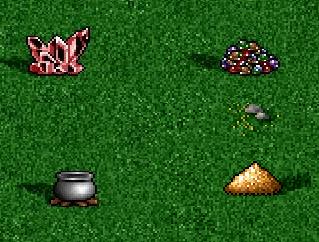
- Population limit and upkeep. Population limit dictates the maximum size of troops.
- Heroes can build structures on the Adventure Map.

- Towns can be converted at certain point, with high costs and time consumption. Limitations on dwellings and special buildings on converted towns are applied and towns which are exactly of an opposing faction cannot be converted, only destroyed or else very poorly availed.
- A Town grants control over an area and any other areas linked to it when they are fully explored (A Fort grants control of only the area they are built on, and a garrison protects the borders or accesses of controlled areas). Flagging control structures, Towns and Forts, of an area will trigger a corresponding number of days (based on default movement) to flag secondary structures, and only if they are not guarded and were, at least once, already visited. Each area has its own perks on maintenance (upkeep) which relates with local production, happiness, logistics, loyalty, scouting, pathfinding and whatnot.
- Tactics skill allows different settings/formations of single stacks of troops, combination of different troops and different settings for the whole army. Might Heroes classified as Commanders are better suited for Tactics strategies.

- There are terrain and weather elements influencing battle and adventure spells/skills. Battle maps are also irregular, with different heights, obstacles, sizes, layouts and interactive elements, either on the map or influenced by external forces.

- Heroes on battlefield influence troops depending on their positioning, given they have an Area of Command (AoC). They can accompany troops for physical boosts, morale, can also channel and cast spells from afar. And keeping an army nearby guarantees their safety against direct engagement against enemy troops or enemy heroes. When engaged without any defensive army, they’ll have a first-person duel as in Might and Magic game, fighting against enemies which level is based on the number of the stack and, if the enemy chooses, their hero will also join the fray as well. The level of engagement in battle varies from hero to hero depending on their classification. Might and Magic Commanders have greater influence and presence on the battlefield. Explorers have presence preceding a battle and after the battle. Rulers have remote control over the battle with the assignment of commanders.

- Spells are universal; they are pure results of the creation of all things. Some schools and guilds of magic transforms the nature of spells into their own means, making spells acquire different perks depending on the faction, still keeping their base utility, even when its nature is tweaked.
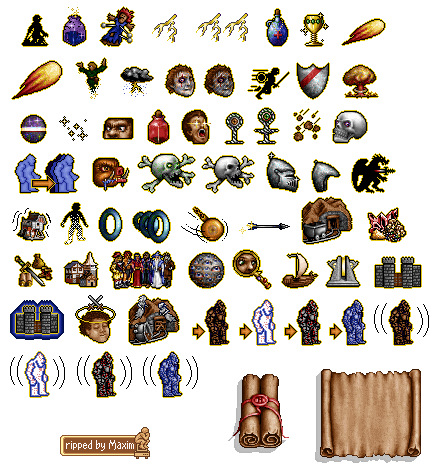
- Each faction has a selection of hirable units, but they are not all available at the same time. Some choices must be taken when developing a town. Besides, only a selection of all units in the game has upgrades. Whilst some others may have equipment and technologies to be researched.
- Stacks of units have limit of numbers. As they increase in numbers they can spread on more than 1 hex of size, in even numbers (however, some Tactics Skill perks can change these settings). This way, when troops engage each other whilst just a part of their armies are in contact, only part of the army will effectively interact. Commanders abilities may influence the max size of units in each hex, max number of hexes a unit stack can spread about and other settings.
- Advanced Posts or Camps can be settled on uncontrolled/unexplored areas, granting the ability to supply troops and keep flagged buildings under control even on areas controlled by the enemy, forcing them to come reconquer these buildings or attack that Post. Resting at camps also doubles effects of recovery and healing. Only one advanced camp is allowed per area of control and only if there is no other allied Fort or Town nearby. They can be evolved into an advanced fort, then a keep.
- Heroes have unique skill-trees, specialties, perks and abilities; and the random aspect is based on proficiency of the hero. There is a custom-hero alternative which allows creating a special evolution tree.

- There are three distinct groups of heroes: Commanders (which are better suited for battles; they also have greater AoC on the battlefield), Explorers (better suited for exploration of maps, logistics, finding dungeons, building advanced posts, expanding borders) and Governors (better suited for building and evolving towns, developing the kingdom’s economy and dealing with diplomacy and all areas of control welfare). And each group have Might heroes and Magic heroes.
- Spell casting in battle, when done by heroes alone, affect a group, an area or an enemy hero, but effects depend mainly on hero spell power. However, when the hero is casting spell and there’s a stack allied units who are spell casters and they have that same spell in their spell book, they can actually imbue a collective spell casting, strengthening greatly the hero spell casting. A hero can also augment a school of magic arts upon spells known by troops, changing their nature.
- Necromaturgy revives the fallen as zombies of their own kin. It only works on living creatures with physical bodies. Necromancy talks and affects spiritual beings (defeated or not) and can embed their power into bodies revived through Necromaturgy. The number of undead under control depends on the hero spell power, given there’s no specific population limit in Necropolis when it comes to the undead. Revived troops rot away as days passes by. After a while, they’ll completely turn into regular lower-tier Necropolis troops. Given the undead do not cost population, their numbers are tied with the Necromancer’s powers and skills, distance and weekly marginal neutral deaths. Necropolis has caravan-like ability which sends away some corpse-finders to supply the kingdom demands on troops.

- Neutral villages or different races may be scattered on areas and they can trade with the kingdom. Diplomacy and maintenance of the area plays a role on how these trades affect. Some NPCs and/or Followers may be found at these locations.
- Animation works in a similar way than both Necromaturgy and Necromancy. However, it’s not about using dead bodies or spirits, but inanimate Constructs which are given artificial life and will act accordingly to their master’s bidding. They also do no cost population, but they’ll drain the caster’s powers to maintain their numbers and their tier. Constructs can be repaired, if they are damaged. If destroyed, they can repaired, but they need to be reanimated after that – a longer and costy process. Differently from the Undead, which if discarded will cease to exist by rotting away, Constructs which will not be used anymore are sent back to the nearest town and can be either recycled for resources or stored for future Animation. Towns with constructs in their line ups have warehouses to store them.

- Donations and Sponsorship for buildings, NPCs, brotherhoods, these things can provide bonuses to the kingdom globally, sometimes affecting units or technologies for everyone on the map.
- Battles are not isolated from external factors. Climate on the Adventure Map will show how climate will appear in battle. So spells cast on the adventure map which influences weather and terrain will also affect battles which take place on enchanted grounds. Adventure Map objects can also influence battles directly or remotely. A Watch Tower, for example, may strike foes every couple of turns if a battle takes place next to it.
- War assets and supplies are considered Upkeep features. The far a hero carries an army away from controlled territory, the less support and supplies one will get. Armies will get restless, weak, stop healing, reinforcements will not be available, neither will be caravans. The same idea applies when there’s a surplus of armies, which cannot be sustained (even on controlled areas). With that information, there’s a week limitation where armies can sustain unfavorable situation. When that time lapse is gone, surplus troops will leave ranks, retreat back to towns, or simply go rogue. Meanwhile, armies that are not granted supply get lower morale, constant weakness state, lower loyalty and even random losses.

- Dungeons can only be visited and cleared by a hero alone. When in this mode, the game will assume a First-Person situation (like in Might & Magic) where battles happen in turns, while exploration happens freely. Some dungeons may be hidden from most heroes, and only the skilled ones may find access, or be able to. Dungeons have their own quests, dangers, rewards, NPCs and challenges. Heroes classified as Explorers are better suited for Dungeons. When the hero enters a dungeon, there’s a time in which armies will stay outside waiting. After that time passes, they’ll head to the nearest controlled garrison. Heroes cannot enter a dungeon when there’s not any controlled garrison under their command, because, in a sense, they cannot risk losing their lives or losing their armies in favor simply to explore a dungeon. Some factions have towns equipped with their particular dungeons, their own training grounds.

- Heroes can tag in duos, always one Might and one Magic. However, the secondary hero will always not be present on the battlefield, and will have a support role based on skills, perks or spells, in a remote assistance. Aside the benefits of having additional support in battle, when the army is defeated (and the main hero is made prisoner, killed, bribed or else, the secondary hero will flee and return to the nearest controlled garrison; only very few exceptions may influence and hinder the secondary hero, including the presence of a secondary hero on the enemy side). Secondary heroes earn a third of experience gained from the main hero when troops are concerned, but gain full experience for their own actions. Secondary heroes are also best suited to fill in the gaps in expertise of main heroes. They can also be used as convoys to require reinforcements and other diplomatic traits. Acting as convoys also help guarantee the effectiveness of reinforcements, given some enemy heroes might have perks and abilities which grants them direct attacks against convoys leaving secretly enemy ranks. So, there’s also a chance that secondary heroes can enter a first-person M&M battle.
- Luck is a global entity and affects most aspects related to chance in game. Only very specific units may have any sort of influence on luck, and even that has a limited reach as well.
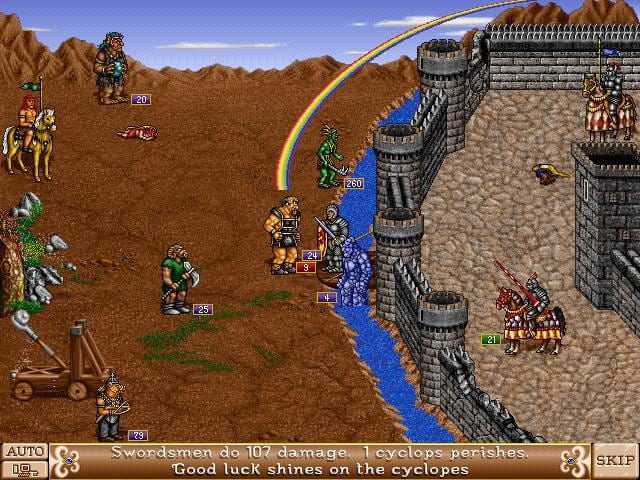
- Morale and Loyalty are elements which tend to make relationship between heroes, factions and troops. Whilst Morale affects battles the more, Loyalty affects diplomacy within the reaches of the kingdom, from battles to areas under control, local population, town growth, etc. Low Morale doesn’t indicate strictly low Loyalty, but unchecked low morale may lead to disloyalty after a while. The advantage of the undead and mindless controlled units is that their loyalty never wavers, such they also have no morale or mind to think.
- Upgrades are evolutionary perks. Creatures cannot be downgraded. It’s also something uncommon; some units have it, others don’t.
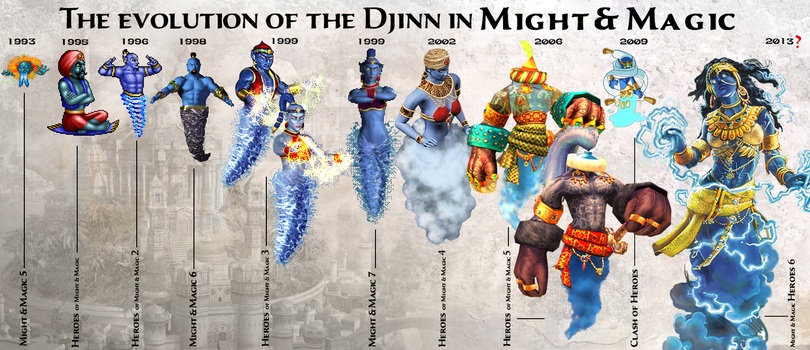
- Heroes have armory caravans which they can carry around with their troops, filling a slot similar to slots of spell book and siege weapons; in a sense they remind ammo cart, which is a part of an armory caravan. Armory caravans can carry equipment used by troops, boosting some of their attributes in battle or giving them any sort of edge. Technologies and equipment are developed in town, and then they are produced, delivered and carried by heroes during their quests. But heroes must also be careful and wary of carrying such things around. If they are defeated, their armory can become spoil of war.
- Town surroundings may affect it dynamically, even influencing which buildings might or might not be built at certain conditions. A new town can be funded, but it cannot be at the same area of control of any other town. It also costs a LOT of resources, requires a Ruler Hero fairly skilled in Leadership, Historian and Engineering and takes a lot of time to be finished. If enemy forces invade, they can even take the building site, kill or imprison the engineer and convert the town for their own purposes.

- Town structures can have different placement sites on town design. That depends on the surroundings which also employ different combination of buildings, for alternated approaches of development. These variable sites may provide slightly distinct effects on the building. For example, if the town has a Lookout Tower in their design, placing that tower on high ground will provide better view radius than placing that tower on lower ground. Defensive buildings are usually the most flexible in terms of placement. Ruler Heroes skilled in Engineering, amongst other traits, are much better suited to find other sites and uses for building placement.
- Town structures can be targeted during sieges, but only after all defensive buildings and siege machines are destroyed. Some castellans may have defensive spells or abilities that also provide additional protection.
- Castellans are units that are singled out of troops to keep towns safe while heroes are away. They remain in town and can be trained to evolve perks of rule and command. When heroes are visiting a town and they get attacked, castellans will join in their ranks (the same kind of units they derived from) and their addition will give a huge boost to their overall stats. The castellan is the last unit to perish in their stack when it’s attacked. Killing a castellan also provides greater experience and spoils, boost of morale, in shock with a fair drop of morale from opposing forces. Only one castellan may be assigned for each town. They can be relieved of duty at any moment. In a sense, they are not a unit, because they don’t subtract from the stack they are singled out, nor they are added back to the ranks when they are relieved of duty.
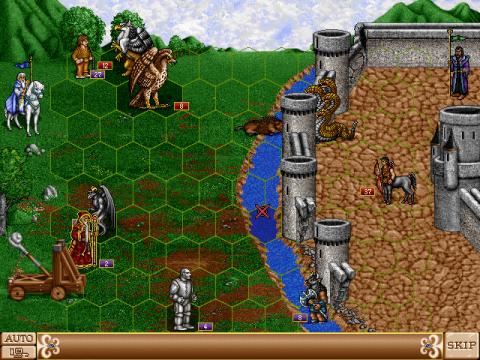
- Spells work around proficiency, which means the more they are cast, the more they will be improved, less charging time, less recovery time, less mana consumption or some other improvements; until they are fully mastered (when a hero will not forget the spell and can cast it even without a book).
- Spell Scroll can be used by any hero. They’ll cast the written spell and the scroll will be consumed by its own magic. Magic heroes can alter the nature of the written spell to their own knowledge. They can also learn the spell if they consume enough scrolls.
- Spell book is used by any hero, but Magic heroes have one since the moment they are hired. Spell books are where heroes write the spells they have learned and their own notes on how to perform and improve those same spells. Spell books are a very important war asset, and they can be even taken as spoils of war. Without their books, heroes can have their spells lose gradually power and even forget spells if they are not cast from time to time. Spell book grant that gradual proficiency improvement to all spells, whilst no decremented by no usage of any spells. When proficiency reaches its maximum rank, the hero is able to produce scrolls of that spell and even teach it in local guilds, where other heroes can learn from.
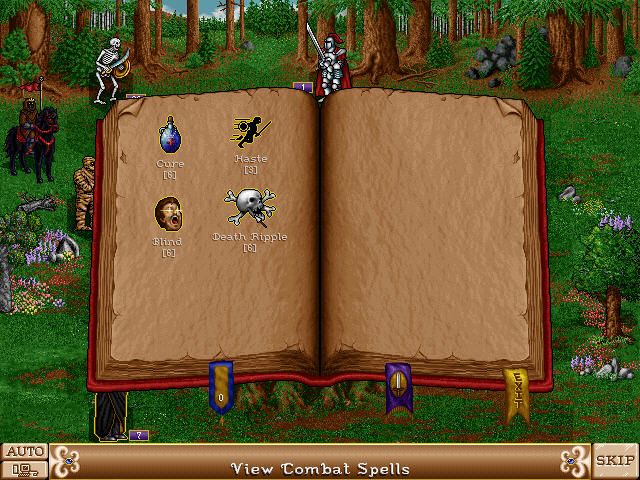
- Mastered Spells have great effects when a hero has a spell book, but the main difference is when a hero has lost or has not the spell book anymore. Mastered Spells can’t be forgotten, but they cannot be directly chosen. The hero will have mastered spells assorted by effects and also based on memory of situations in which they were mostly used. Upon choosing spell casting actions, the hero will select one of the memorized spells best suited for the situation based on some guidelines (these are the ones that can be chosen instead): offensive, defensive, etc. This balance between choosing or not choosing is another point that makes it so important not losing the Spell Book.

- NPCs can assign quests and have a great number of interactions. They are usually immortal, unless if the result of some sort of quest or Campaign requires them to be dead or kills them. Followers work in a similar way they worked in M&M, they’ll provide some sort of bonus to the hero or their troops in exchange of some sort of payment. Some followers can also be assigned to towns, where their talents may uphold a better use. However, followers are heavily affected by Loyalty, and may betray or leave their position, if they don’t feel like following the hero anymore. Some can also be spies. Followers can be killed, if a hero is defeated and the enemy hero chooses not to leave anyone alive. They can also be killed if the town they were assigned to is taken, and their loyalty is too high to allow them working for the enemy.

- There is a day-night cycle. In fact, on the adventure map, each turn corresponds to one cycle. However, each faction has its own perks on day and night, and may have better performance on battles, exploration, rules, etc. during their respective moment.
- Mounts have perks as in Age of Wonders. They are present while the hero is wandering the adventure map and during battles, even when a hero is dueling alone enemy forces. Mounts are left outside dungeons though.

- Flying around the Adventure map is only possible if all units in the army can fly. And even then, they need to finish their movement on solid ground. Besides, weather effects can block access to fliers or even harm them, when it’s hazardous.
- A last standing hero without a home will starve or die in one week.

- When a last town falls, the enemy can claim all conquered riches, because the defeated one will have no place to store all resources. Besides losing the town and home, the defeated lose all resources. That’s why it’s so important not allowing that to happen and if it’s imminent, that all resources are spent or dealt with not to give the enemy too much advantage. That’s also why heroes can bury treasures or build treasury rooms within their domains, hidden for safety. However, some heroes, especially Explorers, have keen eyes to spot hidden elements on the Adventure Map, and may find these treasures. There are also banks controlled by NPCs, which can help with savings.
- The black market can offer almost anything. Things lost in battles against the world or not taken by other kingdoms may resurface in the black market. It can also offer unique elements, technologies, equipment, artifacts, which would not appear on the map by any other mean. Black market cannot be controlled, flagged or bribed. It’s not stationary either.
- Reinforcements are allowed only when they are within one day or two away from the battle. Depending on the distance they’ll take longer to arrive if they are enlisted. A convoy will be sent to bring reinforcements. Some skilled heroes can have the enemy’s convoy killed, making it impossible for them to get reinforcements. Secondary heroes may act as convoys.
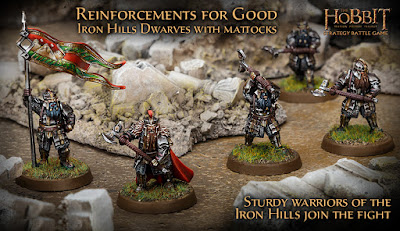
- Wild Life can affect Adventure Map and Battles.
- Every action taken provides experience. Heroes tend to gain more experience bonuses from actions related to their main role. When a hero acts with troops, he/she won’t be able to enact orders to the remaining troops. So they’ll act based on the most common order given to them in that situation.
- Hero gains renown. They will not change classes or anything, but they’ll start having added titles to their names. These stats give them bonuses on interactive elements on the world, while in power, they rely solely on their own. Heroes with high renown grant stronger loyalty. The highest level of renown grants a hero the title of Legendary, which unlocks all perks related to that renown, both in the skill tree, spell casting, exploring of the adventure map, ruling, etc.






